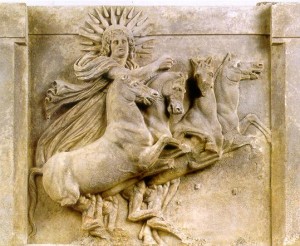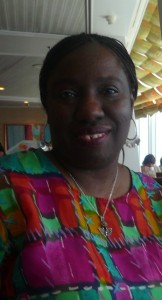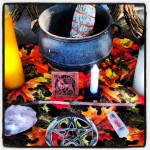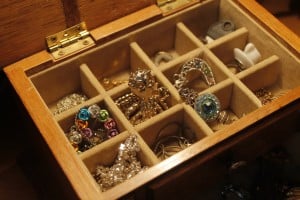by Clio Ajana
Quinquatrus
Six in the evening on a quiet rainy March Saturday in St. Paul can be dreary, even with a partly visible moon. The bare US Bank parking lot across the street from the Sacred Paths Community Center and the slow foot traffic into the corner liquor store said it all.
The distinct smell of Nag Champa and the sound of brass bells permeated the room as I opened the heavy glass door.

“Our Lady of Celestial Fire?” the dark haired woman, dressed in a fluorescent orange sweater and blue jeans, looked closer to fifteen than the twenty-five she probably was, looked up,held a place in her book and nudged her shoulder towards the back. I nodded.
“Set up’s back there. It’s twenty-five an hour now.”
“Sure. Is it okay to pay at the end?”
“Absolutely. Susan will be in later to collect.” She smiled as though relieved not to have to handle money. Some of the volunteers at this center were like that.
“I’m Joan, in case you need anything.”
I chuckled and picked up the heavy bag of ritual papers, food and clothing. Joan was already back into her book by the time I looked up again.
The room, with collage of blue carpet samples, bare spots in the corners, five misshapen tables , and a late 90s microwave stand, reminded me more of my mother’s basement or an antique shop. Our group came for convenience, not the atmosphere: it was on a bus line. The Sabbat feast of Quinquatrus marked the start of the campaign season, just
before spring. Tonight I would state my intentions before the Gods, for the remainder of the year. What would I manifest in my life? What would I nurture? What would I fight to build in my life? Like a warrior, I wore full gear: a white peplos or toga, sewn from crisp white linen bedsheets, a red sash, a set of braided cords (scarlet, black, silver, gold and white), a measure of rope, an athame and brown leather sandals with white seashells. Now, at my fifth Quinquatrus, I was finally campaigning for a change in my own life on paper, in prayer and into action. My writing addressed the harder
questions that I hadn’t dared to do five years ago: infertility, grief and a final spiritual resting place. I needed more of a challenge in the classroom and less of the gypsy existence of adjunct life. Spiritual questions were no longer about my connection to the Gods or why their existence in my life mattered: I was in the driver’s seat of my own life, where the entrance to the mysteries was a reality, not an afterthought.
Perhaps five or six new people might show up. But the rain earlier and the musky, funky Saturday evening, promised just our group, pilgrims in prayer and devotion to our Gods, enjoying the last bits of winter before spring.
I had to find the plug in for the crockpot that someone would inevitably bring, so I asked Joan when she came back to see if I had everything I needed in the room.
“Sure, we have the cord here,” she said, pointing to a tangled mess of one table, four chairs and a thin yellow extension cord that wound through it all.
“Thanks. Do you want to come to ritual?” I asked. It was a polite enquiry.
“Sure. I’ve always wanted to know more about Orisha.” I tried not to raise my eyebrows too much. Here I am, dressed in a white toga with red stola, setting up a Hellenistic ritual that has been advertised in their store. I wondered, did this woman not read? Our group’s name “Our Lady of Celestial Fire” should have been a clue.
“Ummm…” Silence. I don’t know what to say. What can I say in the face of ignorance?
“ Hey, don’t you teach that? Haven’t I seen you giving classes in Orisha here at the Center before?”
And there it was. The moment I dreaded. As a black Pagan, my skin color and dark brown eyes stand out in this northern land of white skins, pink tones, blond or red hair and light colored eyes.
“No. I’m Hellenic Alexandrian. That’s all I’ve done.”
I left my anger and frustration linger in the silence. She paused, with the awkwardness common in these exchanges. Do I save this woman or not? I wonder.
“Oh, okay.” Joan doesn’t flinch from my stare, but rocks back and forth on her feet, her hair dangling at an odd angle.
“You probably met me at Pagan Pride last year.” I toss her a nudge. She grabs onto my words, a sigh of relief in her eyes.
“Yeah. That’s it.” She smiled and walked back to the front.
As we began chanting our opening prayer, the Dialexis a Stauros, I caught a glimpse of dark hair and a bright orange shirt off to the right side. Joan’s body swayed to the invisible rhythm. By the middle part of ritual, the orange had disappeared. On my way out, I saw her again, fingers in book, as she stood by the cash register.
“So, did you like ritual?”
“I couldn’t stay. I liked that sing song part at first, but I had to work in the basement.” She shrugged as though she had no choice in the matter.
“The fridge was dirty, and it was my turn…” Her voice trailed off.
“Maybe next time.” I smiled and left.
I wanted to tell her about my past, before I found my true home in Paganism. I wanted her to see me as more than just a freak, an anomaly in the land of pale whiteness. I was just like her.
I sought the spiritual home that would fulfill me. I didn’t find it with the Christian God for 19 years. I didn’t find it with the Jewish God for 18 years. I found it within the call from the Gods as a Pagan.
Only in Christianity was skin color not an issue. I wanted to ask her: why do you presume that black skin means we only practice African tradition? Why do we, the pagans of color, remain restricted to a box that can be easily identified and marked? Why do you stare when we show up as though we were lost on the way to someplace else? I wanted to ask her in the name of every white Pagan stare and questioning eyes each time I put on my robe and cords, each time I cast a circle, each time I draw down, each time I lead a ritual. The answers were memorized now: no, I’m not crazy.. No, I am not any less black, any less human because I do not practice African tradition. Yes, I am offended by your willful ignorance, by your need to ask these questions, and by my need to be polite and silent in the land of paleness and presumptions.
Bio:
 Clio Ajana is a Hellenic Orthodox High Priestess and member of the Lodge of Our Lady of Celestial Fire, Hellenic Alexandrian tradition. She is deeply passionate about numerology, astrology, herbalism and writing as a spiritual practice. Her current projects include a work on the individual’s quest for a spiritual home and a second work on the intersection of racism, homophobia, and religious non-acceptance in modern Paganism.
Clio Ajana is a Hellenic Orthodox High Priestess and member of the Lodge of Our Lady of Celestial Fire, Hellenic Alexandrian tradition. She is deeply passionate about numerology, astrology, herbalism and writing as a spiritual practice. Her current projects include a work on the individual’s quest for a spiritual home and a second work on the intersection of racism, homophobia, and religious non-acceptance in modern Paganism.
Her life in the Twin Cities of St. Paul and Minneapolis, Minnesota includes writing, teaching, translating, dancing, collecting comic books and enjoying craftwork. She considers everything in my life to be touched by my religious practice and spiritual beliefs.
















